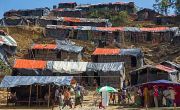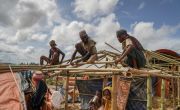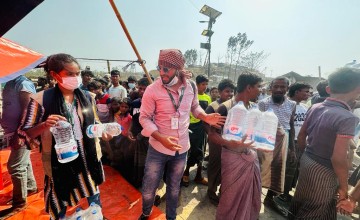
Read our 2024 annual report

Knowledge Hub
Here's what you need to know in 2025.
On August 25, 2017, violence in Myanmar’s Rakhine State forced over 750,000 Rohingya to flee their homes. Eight years later, nearly 1.28 million stateless Rohingya remain in displacement. Over 1 million have spent most (if not all) of that time crowded on a narrow strip of hilly land in Cox’s Bazar, Bangladesh.
While forming one of the largest refugee crises, the Rohingya have been largely ignored since the initial headlines. Meanwhile, they face increasing needs, natural disasters, and a precarious future. Here are five things you need to know about the Rohingya Crisis in 2025.
1. This isn’t an isolated crisis for the Rohingya
This current crisis has become the largest in modern history for the Rohingya. However, it didn’t happen in isolation. Generations of Rohingya have lived in Myanmar’s Rakhine State. However, they had gone unrecognised by the government and denied citizenship. In fact, the Rohingya form the world’s largest stateless population. As such, they’ve had limited access to education, jobs, healthcare, and social safety nets — all resulting in chronic poverty.
They also are targets for marginalisation and violence. The UN has called the Rohingya “one of the world’s most persecuted minorities.” Major attacks have included events in 1978, 1991, and 2016.

2. This is the largest displacement in Asia since the Vietnam War
In the first eight months of 2017, over 70,000 Rohingya fled Myanmar, crossing the border into Bangladesh. That number increased more than tenfold in the weeks following August 25. That evening, violent clashes led to a widespread military crackdown in Rakhine State. In 2023, the UN estimated those initial attacks destroyed 300 villages and killed 10,000 people.
Over half a million Rohingya fled in the first few weeks of these attacks. Many went to Bangladesh, making a dangerous 225 kilometre journey on foot through the jungle or by sea. Ultimately, over 1 million fled. This reduced the Rohingya population in Myanmar by over 50%. This marks the biggest mass-displacement in Asia since the Vietnam War.
Of the 1.278 million Rohingya displaced as of May 2025, nearly 90% have sought refuge in Bangladesh. (Others are being hosted in Malaysia, India, Indonesia, and Thailand.)





3. The world’s largest refugee camp is also one of the most precarious
Before August 2017, Bangladesh was host to approximately 300,000 Rohingya refugees. Today, it hosts over 1.13 million. More than half arrived in those first few weeks of August-September 2017 — a huge influx in a short amount of time.
In response, 33 camps were constructed in Cox’s Bazar, forming the world’s largest refugee camp. However, the terrain in this area consists of uneven, sandy hills, and the shelters are built with bamboo and tarps. Bangladesh is also facing increasingly destructive flood and monsoon seasons (May-October). Its 2022 monsoon season was described as the “worst in recent history,” only to be outdone by 2024's. Floods and landslides during these seasons have caused many Rohingya to lose their homes multiple times in the last eight years.
The camps are also vulnerable due to fires, especially because of the cramped conditions. In 2021, a massive fire displaced nearly 45,000. Another in 2023 displaced 15,000, and another still in 2024 displaced 7,000. Hundreds of fires have been recorded over the years, and even those that cause smaller damage can still take away everything for an individual family.
Amid all of this, the refugee population continues to grow. Violence in Rakhine State escalated again in 2023-24, leading to further displacement. The UN High Commissioner for Refugees (UNHCR) anticipates a total of 150,000 new Rohingya arrivals in Bangladesh in 2025.

4. 95% of Rohingya families in Bangladesh depend on humanitarian aid
When crises become protracted, the need for humanitarian aid increases over time. Over 95% of Rohingya living in Bangladesh depend on humanitarian aid for basic needs — including food, healthcare, and education.
Yet, as emergencies continue, crisis fatigue also sets in. After the initial headlines in 2017, the Rohingya slipped from international news coverage. Funding has stagnated in recent years as a result. As of June 4, the UN’s response plan for 2025 was less than 22% funded. This plan would meet the needs of 1.09 million Rohingya refugees and nearly 400,000 members of the host community in Cox’s Bazar.
These funding gaps have the largest consequences for the most vulnerable people. The UN has warned that, without additional funding to make up the shortfalls, even the most basic needs will be unmet in Cox’s Bazar. This would include closing most Rohingya schools and suspending both primary healthcare services and food distributions in the camps.
This could be catastrophic for the Rohingya, particularly children. Malnutrition rates have risen by 27% compared to last year. The suspension of both food aid and treatment for malnutrition would have lethal consequences. Moreover, one-third of Rohingya refugees in Bangladesh are between 10 and 24. “Without access to formal education, adequate skills building, and self-reliance opportunities,” the UNHCR writes, “their futures remain on hold.”





5. Host communities in Bangladesh are struggling for solutions and resources as well
The needs of a host community is often an overlooked group in any refugee crisis. A 2022 census reports that the population of Cox’s Bazar is approximately 2.8 million. This means that an additional 1 million Rohingya in the area have increased the population by 30%. This places pressures on resources, particularly in Cox’s Bazar, which has historically been a low-income area.
“There is huge socioeconomic and environmental pressure, resulting in increased tension between refugees and the host community,” said Concern’s former Country Director in Bangladesh, A.K.M. Musha. “The tensions will continue to increase unless the host communities are supported well. It's a difficult situation for all.”
In recent years, the costs of labour have become cheaper, resulting in lower incomes. The costs of goods and services have also gone up. One solution that was tested in 2021 relocated around 37,000 Rohingya to the island of Basan Char. Those who moved did so with the promise of more aid. However, drops in funding have left them now with both a lack of supplies and a growing sense of isolation.
There aren’t easy solutions to these issues. Without an adequately-funded response, however, there are even fewer options. In the meantime, millions of lives hang in the balance.

The Rohingya Crisis: Concern’s response
Concern was one of the first organisations to respond to the Rohingya crisis in Bangladesh. In eight years, we’ve worked with hundreds of thousands of Rohingya refugees, and our work has included nutrition support, healthcare services, protection, and livelihoods programmes. At the same time, we’ve worked with host communities to maintain their own food, nutritional, and financial security.
Last year, we reached over 137,000 people in Cox’s Bazar with our integrated nutrition programme. This lifesaving support is provided via 18 nutrition centres across the camps. We also responded to seven natural disasters across 11 districts, providing support to protect both lives and livelihoods.
Donate to our Bangladesh Refugee Appeal
More on the Rohingya crisis: Your FAQ
1. Who are the Rohingya?
The Rohingya are an ethnic minority group who are indigenous to Southeast Asia. They are predominantly Muslim. They have often been described by the UN and journalists as “one of the most persecuted minorities in the world” and are the world’s largest stateless population.
2. Where are they from?
3. What caused the current crisis?
4. Where are the Rohingya now?
5. What are the biggest challenges they’re facing in 2025?
6. What are organisations like Concern doing?
7. What's at stake given the funding cuts?
8. Is there an end in sight to the crisis?



